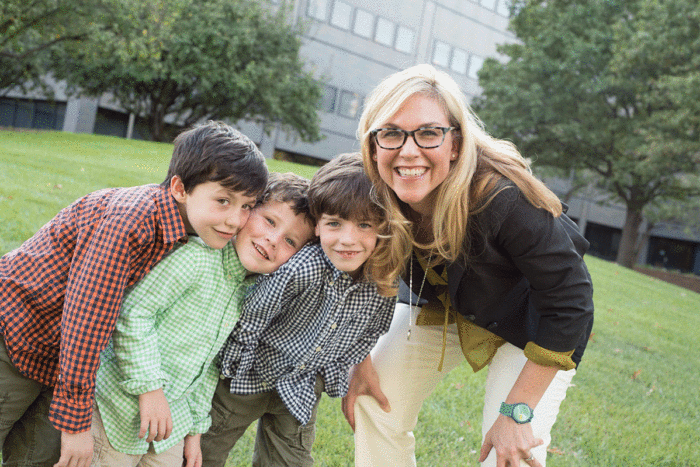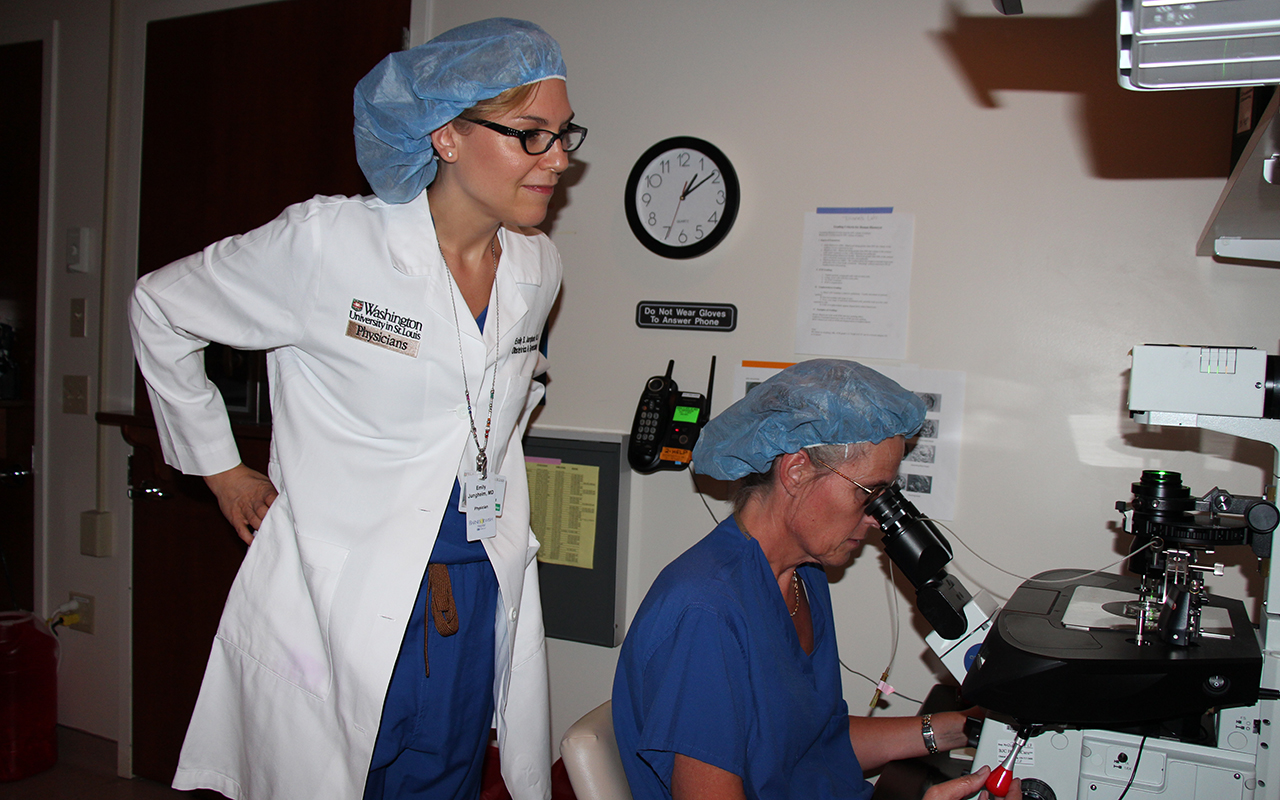Washington People: Emily Jungheim
Reproductive endocrinologist enjoys helping patients build their families
 Robert Boston
Robert BostonFrom the left, Liam, Aidan and Ross Collins visit with Emily Jungheim, MD, an associate professor of obstetrics and gynecology. Bridget Collins, the boys' mother, is Jungheim's patient. Jungheim helped Collins have children through in vitro fertilization.
To Emily Jungheim, MD, an associate professor of obstetrics and gynecology at Washington University School of Medicine in St. Louis, the concept of family is everything. Her greatest joys are having her own family and, in her clinical practice, helping couples who struggle with infertility.
A large bulletin board in her office is covered with snapshots of babies she has helped make possible through in vitro fertilization (IVF). She often runs into such children and their parents at the grocery store or in her neighborhood. “These families are special to me,” she said.
Patient Bridget Collins said words cannot adequately express her gratitude to Jungheim for helping her and her husband build their family through IVF. “She gave us hope after years of frustration,” Collins said. “Because of her, we had our twin boys in 2009 and our ‘baby’ in 2012.”
Jungheim knew as a student at Loyola University Chicago’s Stritch School of Medicine that she would get great satisfaction from working with pregnant women and new mothers. She didn’t learn much about infertility, however, until she began her residency at Duke University School of Medicine, where she became fascinated with the field of reproductive endocrinology.
Following a fellowship at Washington University School of Medicine in St. Louis, she joined the faculty in 2008. Today, she treats women with infertility, recurrent pregnancy loss, polycystic ovary syndrome, endometriosis and other conditions. She also conducts clinical research on subjects ranging from obesity and fertility, to sleep cycles and preterm birth, to ovarian function.
George Macones, MD, the Mitchell and Elaine Yanow Professor and head of the Department of Obstetrics and Gynecology, said Jungheim is a national leader in reproductive endocrinology and infertility and is one of the shining stars in his department. “She is the consummate triple threat —excelling equally in clinical care, research and education,” he said.
Jungheim and her husband, Ken Carson, MD, an assistant professor of medicine at the School of Medicine, have two daughters, Caroline, 9, and Katie, 6.
Jungheim discussed her childhood, her medical education and the path to her career.
Tell us about your childhood.
I grew up in Buffalo Grove, a suburb of Chicago. My dad was one of seven siblings, and my mom was one of four. My dad was a salesman, and my mom worked for an insurance company. Of three children, I am in the middle and have two brothers. We were a very close family. We spent a lot of time together and took wonderful vacations to state parks, where we stayed in cabins or lodges built by the Civilian Conservation Corps. On these trips, we hiked, fished and ate great meals like country ham with red-eye gravy and fried chicken and black-eyed peas that my mom prepared.
How did you become interested in medicine?
I have always liked science, and I volunteered at a hospital in high school. In college, I worked in an endocrinology lab. I decided in medical school that I wanted to specialize in obstetrics and gynecology. I knew it would be rewarding to work with reproductive-age women and that I would always look forward to going to work.
How did you choose your specialty?
I started working in my residency with women who were struggling with infertility. I thought reproductive endocrinology was a fascinating combination of science, clinical medicine and the human component. I liked helping women make big decisions that would affect the rest of their lives. It goes back to the concept of family — having my own and being part of helping others build their families.
 E. Holland Durando
E. Holland DurandoHow has your field changed?
The field of IVF changes so quickly. The lab techniques have greatly improved since I came here 11 years ago. We do more single embryo transfers, unlike the former common practice of transferring multiple embryos. The previous practice often led to twin and triplet births.
Another improvement has been women having access to their frozen embryos, which has greatly extended their ability to have babies later in life. A woman getting a frozen embryo transfer has a 60 percent chance of becoming pregnant.
I also perform many more procedures using donor eggs, which are frozen. Freezing eggs is much easier now, and we have frozen-egg banks. A lot of my patients already have children and are trying to have more.
What is the most difficult part of your job?
It’s hard when someone hasn’t gotten pregnant, with everything we have to offer. A lot of my patients don’t get pregnant. I have to counsel them on how to find some resolve and on the importance of moving on to the next phase of trying to build a family.
If you weren’t an ob/gyn, what would you be doing?
I love to write and might like to write a book to help young women who are considering starting families, especially those with polycystic ovary syndrome. I would like to address lifestyle factors such as diet, nutrition and exercise that may give women better reproductive health outcomes.
How do you spend your free time?
My daughters play Suzuki violin, which I also played growing up. I enjoy listening to them and playing for them. I also enjoy going to their basketball, volleyball and soccer games. And I love to travel — my family just returned from a trip to Japan — and cook.







